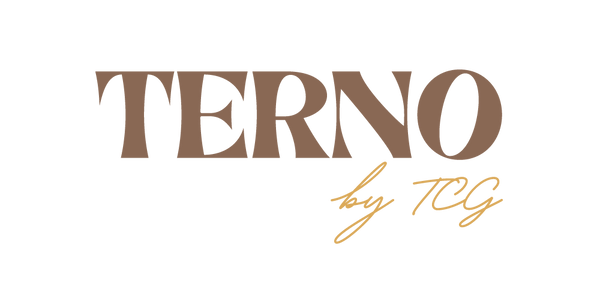Weaving Heritage: The Story Behind TERNO by TCG's Inabel Collection
Babylyn Buchan“To wear an Inabel is to carry with you the rhythm of the loom, the fingerprints of the weaver, the echo of heritage.”
What Makes Inabel So Special
Inabel (also called abel) is the traditional handwoven textile of Ilocos in northern Luzon. Made mostly from cotton, it’s loved for its softness, strength, and timeless beauty — a fabric that feels both cultural and modern.
Among its many styles, two stand out for their artistry: Pinilian and Binakol.
Inabel Pinilian is known as the “chosen” weave. Using a special brocade technique, the weaver adds extra threads to form raised patterns that seem to float on the cloth — like hand embroidery woven directly into the fabric. It’s intricate, delicate, and highly prized for its fine craftsmanship.

Inabel Binakol, on the other hand, is famous for its mesmerizing geometric designs that create an optical illusion, often called the “whirlwind weave.” Woven with careful symmetry, the pattern appears to move — a symbol of protection and balance in Ilocano tradition.

Both are pure expressions of Filipino artistry — Pinilian showing the grace of detail, and Binakol revealing the power of pattern. Each thread carries heritage, patience, and pride — proof that Ilocano weaving is truly a living art.
Because of the care and precision needed — and because some motifs require stopping, counting, adjusting — weaving even a small panel can take days.
Why Our Inabel Pieces Are Priced This Way
At TERNO by TCG, every Inabel piece reflects fair trade, craftsmanship, and cultural value. Authentic Inabel are handwoven works of art — not mass-produced fabric. Each one carries:
- Hours of skilled weaving, often by artisans with decades of experience
- High-quality, scarce materials, from fine yarns to natural dyes
- Limited production, ensuring every piece is one-of-a-kind
- Cultural heritage, preserving Filipino artistry and tradition
Prices for genuine Inabel range from ₱3,500 to ₱10,000+, depending on the weave’s detail and origin. When you see a beautifully patterned Inabel piece, know that the weaver’s hours, the dye, the loom time, and the cultural authenticity are embedded in the cost.
Challenges We Face — and How We Respond
Ilocano weavers continuously face rising material costs, limited access to quality cotton and dyes, and competition from mass-produced “Inabel-inspired” copies. Many artisans also struggle with low income and an aging weaving community, putting generations of skill at risk.
At TERNO by TCG, we respond by working directly with weaving communities, ensuring fair pay and ethical sourcing. We support artisans through mindful production with the use of only authentic Inabel fabric handwoven by Filipino artisans.
Heritage, Identity, and Why Your Choice Matters
Authentic textiles like Inabel are more than just fabric — they are living stories of place, lineage, and identity. Each weave preserves centuries-old techniques, empowers local artisans, and reminds us that mindful consumption can protect culture. Choosing authentic pieces means valuing real craftsmanship over imitation and ensuring that creativity remains in the hands of those who inherited it.
Sadly, mass-produced “Inabel-style” prints copy designs without acknowledgment or benefit to the artisans, flooding the market with cheap versions that harm local weavers.
Protecting Our Cultural Heritage
Under the Indigenous Peoples’ Rights Act (RA 8371), indigenous communities in the Philippines are recognized as rightful owners of their traditional knowledge, including fabrics and motifs. This ensures that their consent is required for the use or commercialization of their heritage.
At TERNO by TCG, we honour this principle through fair collaboration — securing consent, co-creating with artisans, and ensuring they are properly compensated. Every authentic weave we carry is a shared story of respect, heritage, and Filipino pride.

